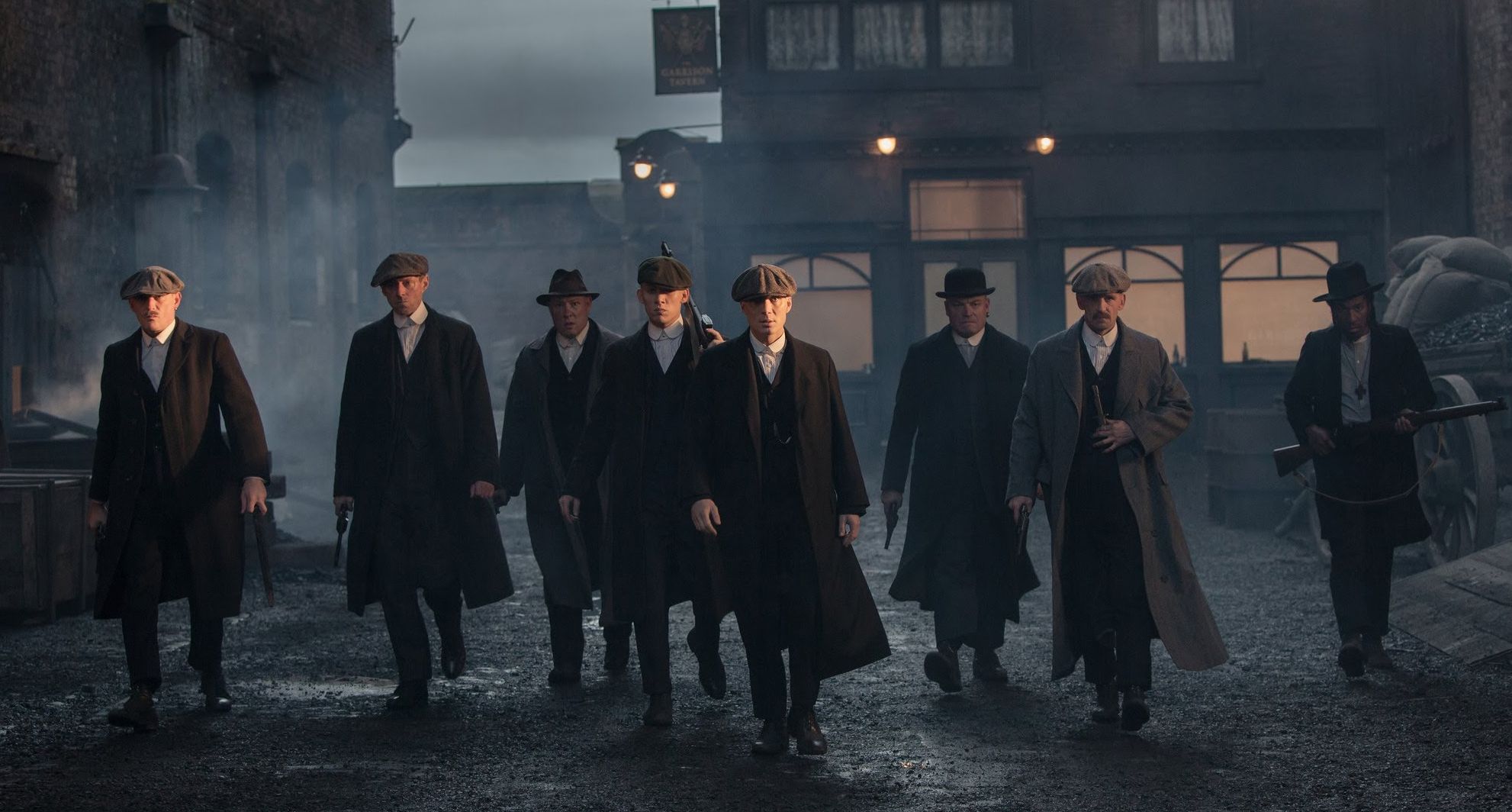
Peaky Blinders, series 1, episode 1
 BBC2’s period gangster drama Peaky Blinders (2013- ) does not disappoint us with its first episode. Its attention to historical detail together with actors straight from the big screen creates a cinematic quality which is more than welcome on our television screens.
BBC2’s period gangster drama Peaky Blinders (2013- ) does not disappoint us with its first episode. Its attention to historical detail together with actors straight from the big screen creates a cinematic quality which is more than welcome on our television screens.
Filmed on the industrial cobbles of Liverpool and Sheffield, Steven Knight has created a post World War One series which embodies all the characteristics of the 1920’s working class, the good and the bad. What separates Peaky Blinders from previous British TV programmes set in this era is its gritty re-creation of Birmingham as a place that feels right for its time. The war has left the men of Birmingham psychologically damaged or in despair, and the women accustomed to a position of control.
Cillian Murphy plays the character of Thomas Shelby, one of the leaders of the Peaky Blinders (so called because of the blades stitched into their flat-caps). The opening scenes feature one shot of him riding through the streets of Birmingham on an incredibly beautiful black horse, producing an immediate impact on the audience. Murphy plays the character with ease, creating a natural authority seconds after we are introduced to him. Instantly we recognise that this is the character to watch out for. His constant smoking creates a screen he can hide behind revealing his personality and past to us only gradually.
A song from more recent times by Nick Cave & The Bad Seeds ‘Red Right Hand’, is the official intro song to the series, a choice which was more than agreeable. The grungy, rustic nature of the song sets the tone of the episode and instantly creates an identity for the series. The song plays as Shelby rides through the broken streets of Birmingham in these first opening scenes and works really well with the industrial setting.
The distinctive set design is something to be admired in this episode. A high level of pastiche is created not dissimilar from that of Boardwalk Empire (2010-2014). The high quality aesthetics and the use of slow motion give the series a stylised feel, blurring the lines between television and film. However, as the episode progresses it becomes clear that the pre-production efforts clearly went into the visual aesthetics, and less so the actors voice coaching. It appears that no character has managed to fully grasp the concept of a Brummy accent. The character of Aunt Polly (Helen McCrory) in particular cannot decide whether she’s in Birmingham, Liverpool or a different continent all together. The Irish accents are also all over the place, even bulbous at times. The issue of the inconsistent accents however becomes forgivable as the episode progresses and we learn more of the Peaky Blinders.
We soon discover that Tommy and his family are the owners of a gambling and bookmakers business and are essentially above the law in Birmingham. But while the men were away at Flanders Fields it was the women who took control of the business, and so have become the voice of reason when the men returned. Even Tommy can be silenced by the voice of his mother. She puts him in his place in a family meeting when she says, ‘this whole bloody enterprise was women’s business when you were away at war’. It will be interesting to see how this theme and the role that women have to play develops. Various other contemporary themes begin to come into play in this episode, such as the corruption of the police and the threat of Irish republicanism through the issue of the missing guns and who has them. Enter Inspector Chester Campbell (Sam Neill), who is more of a bible preacher than a policeman. He is Tommy’s potential nemesis sent all the way from Belfast to uncover the whereabouts of the missing guns.
Tommy’s relationship with characters is something worth observing, particularly the tension between him and his former war comrade, Freddie Thorne (Iddo Goldberg). Thorne foreshadows events in the episode when he says to Tommy, ‘maybe you should put a bullet in his head like they do with mad horses’. Peaky Blinders contains many interesting characters, all effected in some way by the horrors of the First World War. Although it’s been done endlessly in film and television, the use of flashbacks from the war interwoven into the present day works well and gives each of the characters more depth.
That said, the character of Grace couldn’t be more of a cliché if she tried. An Irish song bird who’s singing (in her own words) ‘makes the men stop fighting’, come on? Annabelle Wallis’ portrayal of this already unlikable character is two-dimensional, even boring at times, despite her back-story as a spy with a father killed by Irish republicans. And of course it is inevitable that there will be a love interest with her and our main protagonist, Tommy Shelby. This has the potential to be is an overly romanticised story line that seems almost unnecessary.
Overall, this has been a strong first episode for The Peaky Blinders. It will be interesting to see how the story lines (and hopefully the accents) develop.